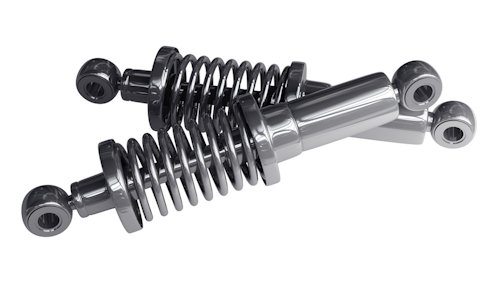


Mobile users:
For best results, view in Landscape mode.

How To Tell If Shocks And Struts
Need Replacement:
Under normal conditions, shocks and struts wear out gradually.
The main reason why shocks wear is because they are constantly
moving.
Even under normal conditions on a smooth repaved road,
shocks stroke over of 1,700 times for every mile traveled.
Inside the shock, a piston travels up and down a tube.
Wear can occur between the piston and tube, and,
over a period of time, oil will pass between the piston
and tube.
If the shock is worn, the springs will have to work harder and
could wear out sooner causing ride height and ride problems.
Many other factors can affect how much wear is actually occurring
and at what rate it is occurring.
For example, two people buy the same kind of car;
the first one lives close to their job, and drives mostly
on repaved roads, and the other lives 20 miles from
their job and travel on mostly pothole infested streets.
Because shocks operate in an extremely hostile
under-vehicle environment, where anything from
gravel & potholes to ice and snow can affect
the life of the product, it is a good bet that the
2nd driver will need to replace his or her shocks
long before the first driver.
The piston rod can easily be nicked or damaged by flying gravel
allowing grit and dirt to damage the piston seal.
If the springs are already worn out, they can
shorten the life of the new shocks and
struts you are installing.
Springs also control the ride height and
the suspension angles.
Shimming a set of weak springs with spacers
or inserts may take care of the sagging and
bottoming problems, but it won’t restore the
ride quality or spring rate.
Among signs of worn shocks or struts:
When stopping quickly does your car rock back and forth?
Do you experience excessive bounce ( 3 or more ) when
crossing an intersection?
While applying your brakes firmly at higher speeds, does your car
drift left or right?
When changing lanes quickly does your car rock or sway from
side to side?
professional advice or service.

